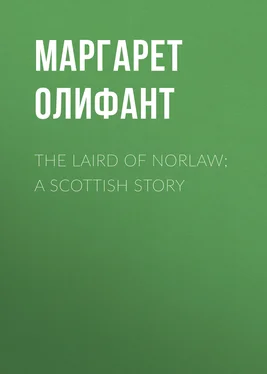Маргарет Олифант - The Laird of Norlaw; A Scottish Story
Здесь есть возможность читать онлайн «Маргарет Олифант - The Laird of Norlaw; A Scottish Story» — ознакомительный отрывок электронной книги совершенно бесплатно, а после прочтения отрывка купить полную версию. В некоторых случаях можно слушать аудио, скачать через торрент в формате fb2 и присутствует краткое содержание. Жанр: foreign_prose, literature_19, foreign_antique, на английском языке. Описание произведения, (предисловие) а так же отзывы посетителей доступны на портале библиотеки ЛибКат.
- Название:The Laird of Norlaw; A Scottish Story
- Автор:
- Жанр:
- Год:неизвестен
- ISBN:нет данных
- Рейтинг книги:3 / 5. Голосов: 1
-
Избранное:Добавить в избранное
- Отзывы:
-
Ваша оценка:
- 60
- 1
- 2
- 3
- 4
- 5
The Laird of Norlaw; A Scottish Story: краткое содержание, описание и аннотация
Предлагаем к чтению аннотацию, описание, краткое содержание или предисловие (зависит от того, что написал сам автор книги «The Laird of Norlaw; A Scottish Story»). Если вы не нашли необходимую информацию о книге — напишите в комментариях, мы постараемся отыскать её.
The Laird of Norlaw; A Scottish Story — читать онлайн ознакомительный отрывок
Ниже представлен текст книги, разбитый по страницам. Система сохранения места последней прочитанной страницы, позволяет с удобством читать онлайн бесплатно книгу «The Laird of Norlaw; A Scottish Story», без необходимости каждый раз заново искать на чём Вы остановились. Поставьте закладку, и сможете в любой момент перейти на страницу, на которой закончили чтение.
Интервал:
Закладка:
With all these fumes in his brain it was quite impossible that Huntley could listen soberly to the sober counsels of Patie, or to the warnings of the old servant. They begged him not to think of a search for Mary. He thought of nothing of the kind. Mary had taken no position of romance in the young man’s fancy. The romance which blossomed in his eyes was a much less disinterested one than that which Cosmo mused upon in the old window of the castle. He thought of himself, of his own family, of all the possibilities and powers of an extensive land-owner, and with the flush of youthful self-belief, of a great life. He had stood thus at the window a long time gazing out, and paying no attention to the occasional words of his sensible brother, when the sound of some one coming roused them both. It was the Mistress’s firm footsteps ascending the stair—they both left the room immediately, agreed, at least, in one thing, to trouble their mother no more with recollections disagreeable to her. Then Patie went about his business, somewhat disturbed by the thought that Huntley meant to throw away a portion of his life in the same fruitless folly which had injured their father; while Huntley himself, remembering something that had to be done at Kirkbride, set off along the banks of Tyne at a great pace, which did not, however, overtake the swing of his thoughts. Marget, coming out to her kitchen door to look after him, held up her hands and exclaimed to herself, “The laddie’s carried!” as she watched his rapid progress—which meaning, as it did, that Huntley was fairly lifted off his feet and possessed by a rapid and impetuous fancy, was perfectly correct—though the fancy itself was not such as Marget thought.
CHAPTER XVI
The village lay bright under the afternoon sun when Huntley Livingstone came in sight of it that day. It was perfectly quiet, as was its wont—some small children playing at the open doors, the elder ones, save here and there an elder daughter charged with the heavy responsibility of a baby, being for the most part safe at school. At the door of the Norlaw Arms an angler-visitor, with his rod over his shoulder, a single figure becalmed in the sunshine, stood lazily gazing about him—and in the shadow of the projecting gable of the inn, another stranger stood holding his horse before the door of the smithy, from whence big John Black, the smith, was about to issue to replace a lost shoe. John was the master of this important rural establishment, and was a big, soft-hearted giant, full of the good-humored obtuseness which so often accompanies great personal size and strength. Inside, in the fiery obscurity of the village Pandemonium, toiled a giant of quite a different order—a swarthy, thick-set little Cyclops, with a hump on his shoulder, and one eye. This was John’s brother, the ruling spirit of mischief in Kirkbride, whom all the mothers of sons held in disgust and terror, and whom Dr. Logan himself could make no improvement in. Jacob, or Jaacob, as he was popularly called, was as strong as he was ugly, and, it was generally understood, as wicked as both. By natural consequence, his rustic neighbors found a considerable attraction in his society, and liked to repeat his sayings, which were not always funny, with explosions of laughter. Huntley’s errand, as it happened, was with this individual, who was somewhat of a genius in his way, which was the way of agricultural implements. Jaacob had even taken out what he called a “paatent” for a new harrow of his own invention, and was, in right of this, the authority, on all such matters, of the country-side.
“Ye’ll be carrying on the farm then?” said Jaacob. “A plow needs mair than a new coulter to drive it through a furrow—it’ll be new work to you, Mr. Huntley, to gang atween the stilts yoursel’.”
Huntley had descended suddenly out of the hurry of his fancies about Melmar, of which he already saw himself master. He came to the ground with rather a rude shock when he heard these words, and found himself on the hard earthen floor of the smithy, with the red sparks flying into the darkness over his head, and Jaacob’s one eye twinkling at him in the fiery light. He was not the laird of Melmar to Jaacob, but only the son of the ruined Norlaw.
“What we want in the meantime is the plow,” said Huntley, somewhat sharply, his face flushing in spite of himself; then he added, after a pause, all the humiliation of debt and poverty recurring to his mind, which had been defended for some time against that lesser pain by the excitement of grief, and to-day by the violent flush of ambitious hope. “I believe there is a bill—but if you’ll send it up to the house I’ll see to it without delay.”
Bowed Jaacob was not ungenerous in his way, but he scorned to defend himself from any imputation of ungenerosity. He did not hasten, therefore, as might have been supposed, to say that the aforesaid bill was of no importance, and could wait. On the contrary, he proceeded, with sarcastic dryness in his tone:
“You’ll find it hard work to get in your craps. How many acres have ye in wheat the year, Mr. Huntley? You’ll no’ ken? Houts, man! that’s an ill beginning for a lad that farms his ain land.”
In spite of himself, tears of mortification stole into Huntley’s eyes. He turned his head away with a muttered exclamation.
“I don’t know that we’ve half an acre safe!” cried Huntley, in the bitterness of his heart. His dream was broken. Me’mar, who was their chief creditor—Me’mar, whom he had not yet displaced—might be able to get into his hard worldly hands, for aught Huntley knew, every slope of Norlaw.
“Aweel, aweel, lad,” said Jaacob, striking his hammer fiercely upon the glowing iron, “a’ the better for you—you’ll be your ain man—but I wouldna cheat myself with fancies if I was you. Make up your mind ae way or another, but dinna come here and speak to me about plows, as if that was what your mind was set on. I’m no’ a Solomon, but if you mean to thrive, never delude yoursalf with a sham.”
“What’s a’ that?” said big John, as his customer mounted the reshod horse, and trotted off in leisurely fashion as became the day; “has Jaacob won to his books, Mr. Huntley? but I reckon he has his match when he has you.”
John, however, who was rather proud of his brother’s intellectual powers, thought no such thing—neither did the little Cyclops himself.
“Mind your ain business,” said Jaacob, briefly; “what do you think a man learns out of books, you haverel? Na, if I’m onything, I’m a man of observation; and take my word, lad, there never was a man trove yet till he saw distinck where he was, and ordered his ways according. There’s mysel’—do you think I could ever make ony progress, ae way or another, if I minded what a’ these stupid ideots say?”
“What do they say?” said Huntley, who was too much occupied with his own thoughts to perceive the drift of Jaacob’s personal observations.
“Na, d’ye think I’m heeding?” said Jaacob; “a man can rarely be more enlightened than his neighbors without suffering for’t. A’ this auld machinery of the world creaks like an auld bellows. There’s naething but delusions on every side of ye. Ye canna be clear of a single thing that ye havena conquished for yoursel’.”
Huntley, who had come out of the languid August afternoon, red in a glow of sunshine and heat, to which the very idea of long labor was alien, which accorded well enough with his own ambitious dreams and thoughts of sudden fortune—could not help feeling somehow as if Jaacob’s hammer, beneath the strokes of which the sparks flew, struck himself as well as the iron. Melmar dissipated into thin air, in the ruddy atmosphere of the smithy. The two darkling giants, large and small, moving about in the fierce glow of the firelight, the puff of the bellows, plied by an attendant demon, and the ceaseless clank of the hammer, all combined to recall to reality and the present, the thoughts of the dreaming lad. In this atmosphere the long labors of the Australian emigrant looked much more reasonable and likely than any sudden enrichment; and with the unconscious self-reference of his age, Huntley took no pains to find out what Jaacob meant, but immediately applied the counsel to his own case.
Читать дальшеИнтервал:
Закладка:
Похожие книги на «The Laird of Norlaw; A Scottish Story»
Представляем Вашему вниманию похожие книги на «The Laird of Norlaw; A Scottish Story» списком для выбора. Мы отобрали схожую по названию и смыслу литературу в надежде предоставить читателям больше вариантов отыскать новые, интересные, ещё непрочитанные произведения.
Обсуждение, отзывы о книге «The Laird of Norlaw; A Scottish Story» и просто собственные мнения читателей. Оставьте ваши комментарии, напишите, что Вы думаете о произведении, его смысле или главных героях. Укажите что конкретно понравилось, а что нет, и почему Вы так считаете.












